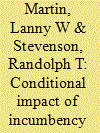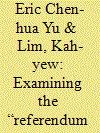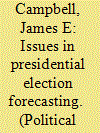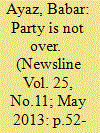| Srl | Item |
| 1 |
ID:
100768


|
|
|
|
|
| Publication |
2010.
|
| Summary/Abstract |
Previous research on coalition politics has found an "incumbency advantage" in government formation, but it has provided no clear explanation as to why this advantage exists. We classify existing theories as either preference-based or institutions-based explanations for why incumbent coalitions might be likely to form again, and we integrate these explanations into a coherent theoretical argument. We also claim that it is possible, to some extent, to distinguish these explanations empirically by taking into account the "historical context" of coalition bargaining. Using a comprehensive new data set on coalition bargaining in Europe, we show that coalitions, in general, are more likely to form if the parties comprising them have worked together in the recent past, and that incumbent coalitions are more likely to re-form if partners have not experienced a severe public conflict while in office together or suffered a recent setback at the polls. The incumbency advantage disappears completely if partners have become mired in conflict or have lost legislative seats (even after accounting for the impact of seat share on coalition size). Moreover, in certain circumstances, institutional rules that grant incumbents an advantage in coalition bargaining greatly enhance their ability to remain in office.
|
|
|
|
|
|
|
|
|
|
|
|
|
|
|
|
| 2 |
ID:
180697


|
|
|
|
|
| Summary/Abstract |
This paper analyzes the extent to which the performances of local and national governments can shape local election outcomes. Specifically, we use various waves of survey data from Taiwan’s Elections and Democratization Studies (TEDS) to explore whether a person’s assessments of local and central government performances affect his/her vote for the incumbent party candidate. Our empirical findings partially verify the so-called “referendum theory” and can be summarized as follows: First, voters who hold a positive assessment of the performance of local government are more likely to vote for an incumbent who seeks reelection, but this is not necessarily the case for an incumbent party candidate in an open-seat contest. Second, Taiwan’s local elections cannot be regarded as referenda on the central government because the central government approval rating does not consistently affect vote choices across different types/levels of local elections.
|
|
|
|
|
|
|
|
|
|
|
|
|
|
|
|
| 3 |
ID:
159757


|
|
|
|
|
| Summary/Abstract |
Fenno’s Paradox—the preference for one’s own legislator while disliking the legislature as a whole—remains one of the most consistent findings in American politics. This tendency increases the likelihood for incumbents to win reelection, despite being a part of a less popular institution. Little analysis looks at whether Fenno’s Paradox exists outside of the US in other legislative contexts, or whether incumbency itself or partisan identification is the larger influence. Using 2012 survey data from Taiwan, a mixed member system, this analysis examines individual level divergence between preference for a legislator and institutional preference. Consistent with work in American politics, we find a marginal incumbency advantage, but this effect is attenuated by the partisanship of the district legislator.
|
|
|
|
|
|
|
|
|
|
|
|
|
|
|
|
| 4 |
ID:
131651


|
|
|
| 5 |
ID:
119598


|
|
|
| 6 |
ID:
113201


|
|
|
|
|
| Publication |
2012.
|
| Summary/Abstract |
In 2004 and 2009, the incumbent central governments in India enjoyed a high level of voter satisfaction. Why then did incumbents lose elections in 2004, while winning them in 2009? The different electoral outcomes can be explained by a combination of satisfaction with a constituent's member of Parliament and the performance of the government at the state level, as well as satisfaction with the government at the national level. This analysis rejects the conventional argument of general satisfaction with the performance of the central government as being the determinant of electoral outcomes in national elections.
|
|
|
|
|
|
|
|
|
|
|
|
|
|
|
|